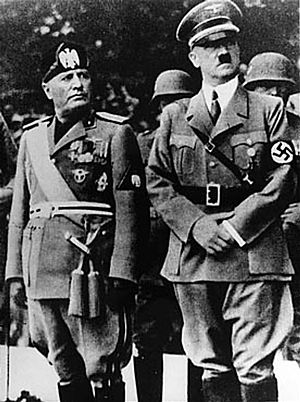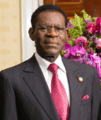Dictator facts for kids
A dictator is a leader who has total power over a country. They often use force and fear to stay in charge. A country ruled by a dictator is called a dictatorship. This type of government is often seen as unfair or harsh.
The word "dictator" comes from ancient Rome. In the Roman Republic, a leader could be given full power for a short time. This was only during emergencies. Julius Caesar was a famous Roman leader. He was the last Roman to hold this special "dictator" role.
Dictators can come to power in different ways. Some lead a revolution to take control. Others might win an election first. Then, they might cancel future elections or change the rules. Sometimes, it is hard to tell if a leader is a dictator. This is because some leaders might rig elections.
Kings and emperors also have great power. But they are usually not called dictators. This is because their power often comes from their family. A dictator, however, usually takes power themselves. They create their own position as ruler.
Contents
What Makes a Leader a Dictator?
A dictator is a leader who rules with absolute power. They do not share power with others. They make all the laws themselves. They often use the army or police to control people. People might be afraid to speak out against them.
How Dictators Get Power
Dictators often gain power in a few ways.
- Taking Power by Force: Some dictators lead a revolution. They might overthrow the old government.
- Winning Elections and Staying: Others might win an election. But once in power, they stop future elections. Or they make sure they always win.
- False Election Results: Some leaders might pretend to have elections. But they change the votes to make themselves win.
Dictators vs. Kings
Kings and emperors are born into power. Their family has ruled for a long time. Dictators are different. They usually take power themselves. They do not inherit their position. They create the role of dictator.
Famous Dictators in History
Many leaders throughout history have been called dictators. Here are some well-known examples:
- Adolf Hitler in Germany
- Benito Mussolini in Italy
- Joseph Stalin in the Soviet Union
- Mao Zedong in China
- Fidel Castro in Cuba
- Francisco Franco in Spain
- Augusto Pinochet in Chile
- Saddam Hussein in Iraq
- Pol Pot in Cambodia
- Kim Il-sung in North Korea
More Recent Dictators
Some leaders in more recent times are also seen as dictators.
- Kim Jong Un in North Korea
- Vladimir Putin in Russia
- Bashar al-Assad in Syria
- Alexander Lukashenko in Belarus
- Xi Jinping in China
- Nicolás Maduro in Venezuela
Related pages
Images for kids
-
Teodoro Obiang Nguema Mbasogo of Equatorial Guinea is Africa's longest serving dictator.
-
Giuseppe Garibaldi proclaimed himself dictator of Sicily in 1860.
-
Pol Pot was the leader of the Khmer Rouge in Cambodia.
See also
 In Spanish: Dictadura para niños
In Spanish: Dictadura para niños
 | Audre Lorde |
 | John Berry Meachum |
 | Ferdinand Lee Barnett |






